
Background information
"Fata Deum": How much potential is there in the new simulation of the gods?
by Kim Muntinga

They are neither building games nor strategy games, but a bit of both: god simulations follow their own rules. Why the genre is still fascinating today despite its niche status and where it quietly lives on in the indie sector.
Sometimes it's not enough just to be a hero. Not just the saviour of humanity who saves the universe from the apocalypse. I want more. I want to create, judge, shape, destroy and rebuild. I want to be «God». At least for a few hours of play.
I love playing God. Not in the religious sense, but in games where I can shape continents, divert rivers, make volcanoes erupt or watch little creatures grow with a click. God simulations are some of the strangest, most fascinating types of games I've ever tried.
It's the mixture of power fantasy and observation experiment that draws me back to these games time and time again. Everything is in my hands and at the same time so much happens without me having to do anything. That's precisely the attraction for me: being able to intervene without controlling everything.
The genre of god simulations is surprisingly diverse. It ranges from games that put me directly in the role of a creator as an omnipotent entity to titles that only contain individual god-like mechanics without ever using the word «god». There are numerous variations between these extremes: Sometimes I am at the centre of world events, sometimes I am just an invisible impulse generator.
In its narrower form, I understand a god simulation to be a game that gives me almost divine intervention options without me directly controlling individual units. However, the genre is generally defined more broadly: A god simulation is a game genre in which you take on the role of a god or god-like supernatural entity and control the destiny of a world, a people or other creatures, usually indirectly.
This definition includes classics such as «Populous», «Black & White» or «WorldBox» as well as titles that do not explicitly specify a god role but use similar mechanics. These include, for example, titles such as «Dungeon Keeper», «RimWorld», «Spore» or «The Sims».

Both definitions - the narrow and the broad - have their justification:
The first describes the classic God Game with a clear creator fantasy. The second shows how the principle of indirect intervention has crept into many modern game mechanics - even without a halo.
The line between god game and Management is becoming increasingly blurred. While the classic god simulation stages omnipotence as a game fantasy, the idea of indirect intervention appears in many hybrid games today. The decisive factor is not the mention of the word «God», but the perspective from which I change the world.
However, classic city-building simulations such as «SimCity» or «Anno» are not part of this for me. There, I am a human planner, mayor or manager with clear goals, tasks and economic control.
If you want to understand god simulations, you have to travel back to 1989. A small British studio called Bullfrog Productions released a game that seems inconspicuous from today's perspective, but at the time founded a completely new genre: «Populous». The game was penned by Peter Molyneux, a name that would later make headlines several times with godlike ideas.
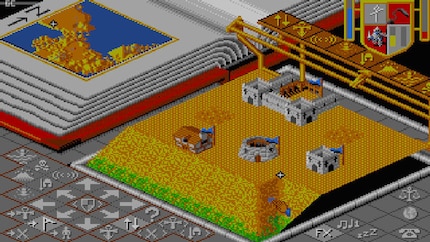
I still remember my first contact with «Populous». The pixel art was minimalistic, the controls took some getting used to and yet everything felt bigger than the game itself. I formed hills, levelled land, watched little believers start to build, grow, fight. I was not their leader. I was their world.
The goal was to grow their own people and displace those of the opposing «god».
What set «Populous» apart was not just the gameplay, but the perspective. For the first time, I wasn't the hero fighting against evil. I was the myth that was at work in things. Not a role in the classic sense, but an idea. This abstraction made the game timeless. Even if it seems technically outdated today, the core of every true god simulation still lives on in «Populous».
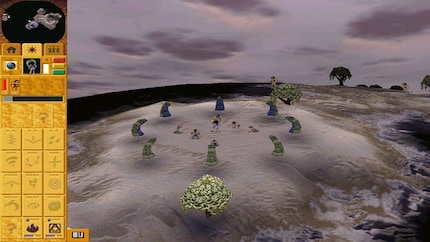
Bullfrog later released several successors («Populous II», «Populous: The Beginning») and continued to shape the genre. The big bang was here. The simulation of the gods was born.
Few games have taken the concept of god simulation to the next level as elegantly and provocatively as «Black & White». Once again, Peter Molyneux was behind the project, which was released in 2001: this time under the banner of his new studio Lionhead. For me, «Black & White» was more than just a strategy game with a divine facade. It was a moral experiment wrapped in a sandbox of wonder, ritual and reflection.
At its core, the game idea remained familiar: I took on the role of a god who ruled over a small island world, adored and worshipped by the faithful. I could intervene, work miracles, move buildings, give food or hurl fireballs. But the real novelty lay elsewhere: the game was watching me. It didn't judge, but it remembered.

«Black & White» introduced a morality system that not only documented my decisions, but visually changed the world. If I acted kindly, my divine avatar became brighter, friendlier. The landscape blossomed, the music and atmosphere seemed peaceful. If I chose the path of violence, the world became darker, more threatening in colour, even my temples took on a different shape. I literally became a mirror of my choices.
The centrepiece of the game, however, was my creature: a giant beast that I raised, fed, praised or punished. This AI-controlled creature learned from my behaviour: If I was merciful, it helped farmers in the fields. If I was cruel, it ate children. And as I watched, I often asked myself: was it bringing out evil or just me?
Despite its creative courage, «Black & White» was not a perfect game. The controls were cumbersome, the learning curve steep, and some mechanics felt unfinished. And it did something that hardly any game before or after it has achieved: It made me feel what it means to be God.
Four years later, «Black & White 2» was released as a sequel, which retained the basic principle but changed it considerably. The focus shifted significantly towards strategy: I could now build cities, recruit units, command armies and my divine presence became a power in the service of a classic game of conquest.
Morale remained visible: my creature adapted to my behaviour, the world reacted to my decisions. But the subtle balance of observation, influence and self-reflection was lost to some extent. Instead, a clearer game structure with mission objectives, military conflicts and fixed victory conditions dominated.
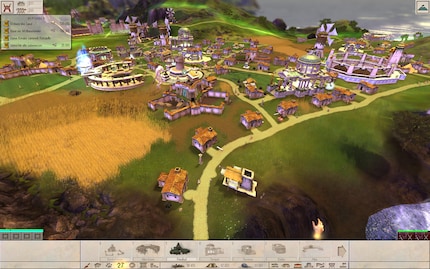
«Black & White 2» was more beautiful, more structured, but also tamer. The magic of the original, this constant feeling that the game was secretly watching me, gave way to a much more calculated game mechanic. Nevertheless, the second part remains relevant for the genre: as an attempt to make the God Game more suitable for the masses. And failing at the balancing act between ambition and customisation.
After «Black & White», the genre of god simulations seemed to have said it all. There was no more revolution, no big publishers still interested in the game principle. Instead, the focus of the games industry shifted: real-time strategy became competitive, building games became detail-oriented, morality became a dialogue option instead of a game mechanic. And gods? They slowly disappeared from the scene.
I remember a strange emptiness after «Black & White». It was as if the genre had exaggerated itself and then found no more room. The classic god simulation was too big, too risky, too difficult to market. A powerful AI, open game systems, no clear objective, no conventional progression. It didn't fit the mould of an industry that increasingly relied on safe mechanics and predictable monetisation.
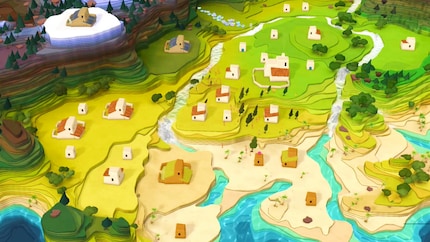
The few attempts to keep the genre alive remained pale. «Godus», for example - again initiated by Peter Molyneux - promised a spiritual successor to «Populous», but failed spectacularly due to high expectations, inconsistent design and disappointed Kickstarter backers. It was a relapse into empty promises.
And yet: the genre never disappeared completely. It just retreated. Into the underground of indie development, where freedom and experimentation became possible again. Suddenly, games appeared that were reminiscent of the old virtues but broke new ground: «WorldBox», «Reus» and «The Universim».
«WorldBox» by Maxim Karpenko is probably the most accessible God Game of recent years and perhaps also the most honest. There are no quests, no missions, no story. Just a world that I create and populate. And I can destroy it at will. Muahaha.
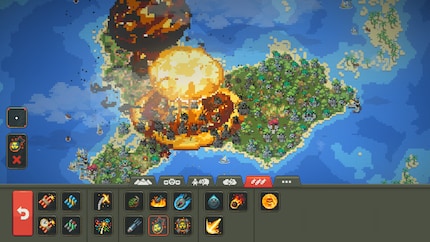
I can settle humans, elves, orcs and dwarves, give them land or impose wars. I can make it rain meteorites, sink entire continents or bless a civilisation with magic. The game world reacts to my intervention, grows and changes. Often faster than I can see.
«Reus» from 2013, developed by Dutch studio Abbey Games, takes a completely different tone. Instead of a single all-powerful deity, I take control of huge spirits of nature - such as a forest giant, an ocean titan and a rocky mountain colossus. Each of them represents a certain aspect of nature and has unique abilities.
Together with these giants, I shape the surface of a planet: I grow forests, raise mountains, create animals, resources and fertile land. But the actual inhabitants - small, primitive human settlements - act completely autonomously. I cannot control them, only create the conditions under which they live.
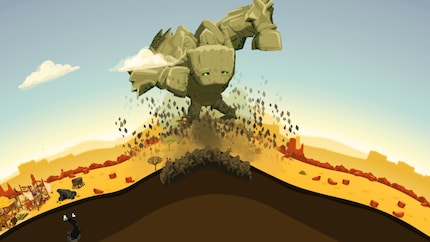
And that's where it gets exciting: If I give them too many resources, they become greedy and aggressive. If I keep them scarce, they remain peaceful but stagnate. «Reus» is not a game about control, but about influence. I observe how my decisions shift the balance of the world without ever completely controlling it.
In 2024, the long-awaited successor «Reus 2» was released, taking the concept to the next stage of development. Instead of one endless planet, I now build several planets in parallel: each with its own biotope, its own conditions, its own inhabitants.
«Reus 2» is mechanically more complex, but at the same time more clearly structured than its predecessor. It is a game about long-term responsibility, about the interplay between abundance and moderation, between growth and balance. And it remains true to its basic principle: the gods don't talk - they create.
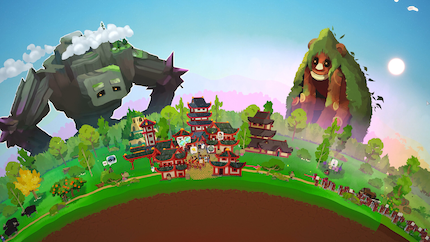
«Reus» is almost meditative. It feels like an ecological balance game that doesn't make me a moraliser, but a silent co-creator of a dynamic world. The gods here are not judges, but balancers.
If there is one indie title that attempts to combine «Black & White», «Populous» and «Spore» in one, then it is «The Universim» by Crytivo. The game takes an ambitious approach: from the Big Bang to interstellar civilisation, with divine intervention at every stage of development.
I start with a primitive people in the Stone Age, help build the first huts, prevent droughts, influence the weather and watch as technology, politics and society develop. The game remains in a bird's eye view: I am not part of the world, but its guiding framework.

In contrast to «WorldBox» or «Reus», «The Universim» offers significantly more classic game structures: resources, research, progress. But the god mode remains the same. I send lightning, heal the sick, punish sinners. It's a balancing act between building game and god simulation that doesn't always work perfectly, but aims to bring the genre back to the big stage.
Not every game that feels like a god simulation formally belongs to the genre. Many titles give me god-like control, let me shape worlds, influence destinies and indirectly decide over life and death. Without calling themselves a «God Game». Sometimes for stylistic reasons, sometimes for thematic distance. But the feeling of being above it all remains.
A prime example is «Spore» by Maxis from 2008. The game starts microscopically small. I control a single creature through the primordial soup. But with each development phase, I grow: first into a creature, then into a tribe leader, finally into a civilisation and finally into an interstellar empire. In the galaxy phase, I influence entire planets, terraform, shape ecosystems and control the fate of entire species. I'm not a god, but it often feels like one.

«Spore» is not a classic God Game. There is direct control, clear progression and linear phases. However, the topic of creation, indirect influence and the cosmic perspective is present throughout.
The Sims «» is completely different, but no less divine. This is not about forces of nature, but about social micro-worlds. I create people, build their houses, determine their environment and observe how they interact, love, argue or fail. I can help, manipulate, intervene or simply let things run their course.

What makes «The Sims» exciting is the combination of autonomy and dependency: the game characters have their own will, but react to everything I change. This is very reminiscent of god simulations - only without lightning strikes or temple building. Instead, I decide whether to have breakfast or a pool without a ladder.
With «Dungeon Keeper» by Bullfrog from 1997, the divine perspective returns: this time, however, to a hellish underground realm. I am a sinister ruler who expands a dungeon, lays traps, attracts creatures and fights heroes. Most systems are based on indirect control: I design rooms, influence behaviour via incentives and punish disobedience. My servants follow my logic, not my direct command.
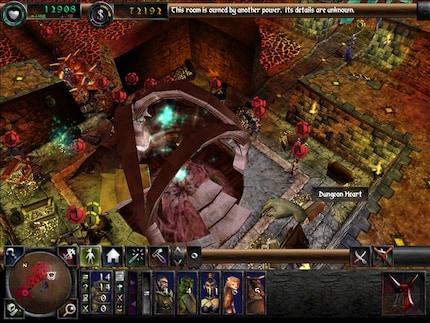
But «Dungeon Keeper» goes one step further: I can pick up creatures by hand, send them to training or throw them directly into battles. In the so-called possession mode, I even take control myself. As an ego god in the middle of the action. It is this alternation between distance and intervention that makes the game so special.
In 1999, «Dungeon Keeper 2» was released as the successor: technically more modern, with 3D graphics, improved user guidance and an even more accessible design. The game expanded on many of the original's mechanics, but remained true to the core principle.
Although «Dungeon Keeper» formally belongs to real-time strategy, its appeal lies in the Management of a world that follows my dark vision. Half god, half overseer. A simulation of the gods? Perhaps. But certainly one where the devil is in the detail
In «RimWorld» I don't slip into the role of a god. And yet the game often feels exactly like that. I oversee the survival of a colony on a distant planet, shape its environment, define priorities, determine construction plans, medical treatments, eating rules and moral standards. The colonists act largely autonomously: they eat, sleep, research and build according to their own needs.
And yet I am more than just an observer. I can intervene directly in critical situations: I put colonists into combat mode, give specific orders («Do this now»), or force them to act. Especially in battles, medical emergencies or when transporting prisoners, it becomes clear that I can not only create a framework, but also exercise active control. At least selectively.
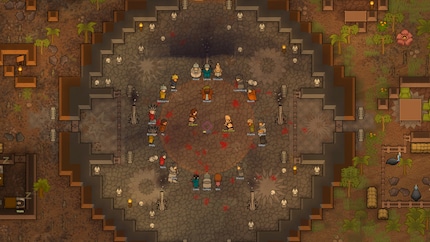
What makes «RimWorld» special is its long-term influence: I can shape entire societies, including religion, ideology, values and social structure. I determine what my colony believes in, what is considered virtue, what is punished. I don't intervene with a divine gesture, but by permanently shaping the world in the background.
«RimWorld» is therefore not a classic god game. However, it conveys a similar feeling: shaping instead of controlling, with the option to intervene. A hybrid game that interweaves control, responsibility and unpredictability and often forces me to act like a god without actually being one.
God sims may have faded from the spotlight, but the feeling of indirectly shaping a world lives on: in indie games, hybrids and unexpected corners of modern game design. I see it in colony Management games, emergent systems, sandbox fantasies. Not as genre hype, but as a game idea that has never completely disappeared.
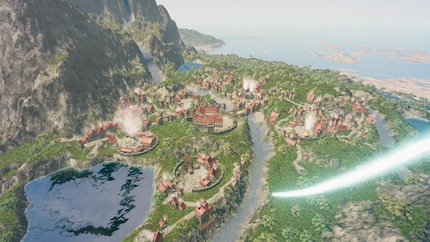
And maybe there's more to come. «Fata Deum - The God Sim», an upcoming title from Germany, wants to revive the classic God Game principle: with miracle effects, competing gods and a game world that reacts to my influence. At least the game promises a lot.
At the same time, «Sintopia» is in the starting blocks: a satirical mix of god game and economic simulation. In a retro-inspired scenario, you take over as the boss of a hellish bureaucracy empire, managing sins, spam automation and profit. The game aims to combine arena management with divine creative will.
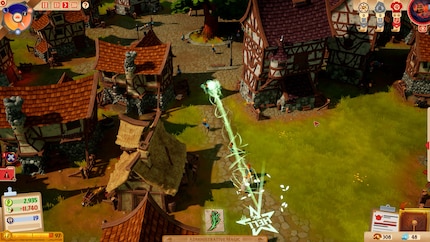
Will it make a comeback? Who knows. But as long as there are games in which I get to design instead of command, the divine principle lives on for me.
What is your personal classic among the god simulations? Does the god simulation genre have a future? Write it in the comments.
My interests are varied, I just like to enjoy life. Always on the lookout for news about darts, gaming, films and series.
Interesting facts about products, behind-the-scenes looks at manufacturers and deep-dives on interesting people.
Show all